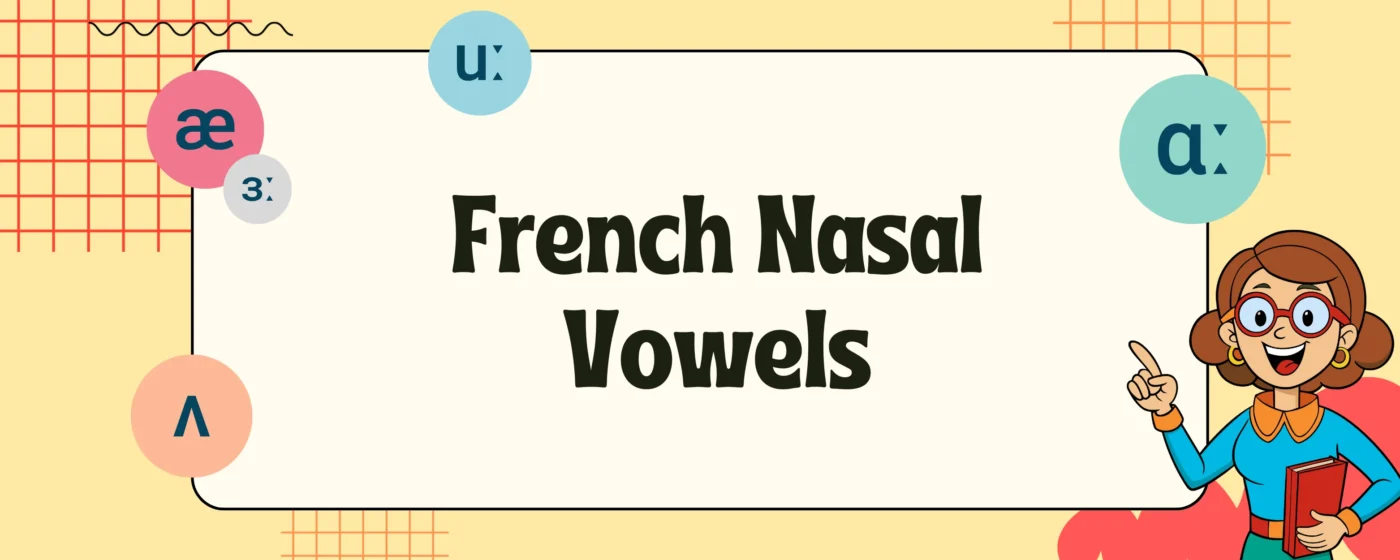Common Regular -ir Verbs in French: Learn How to Conjugate

Main verbs in French convey actions or states. Regular verbs follow predictable patterns based on endings (-er, -ir, -re). Irregular verbs have unique conjugations. Reflexive verbs indicate actions done to oneself. Modal verbs express ability, necessity, or possibility. Phrasal verbs combine with particles. Impersonal verbs lack a specific subject.
Regular -ir verbs are the second-largest category in French. They follow predictable conjugation patterns, typically ending in -is, -is, -it, -issons, -issez, -issent. Examples include “finir” (to finish), “choisir” (to choose), and “partir” (to leave).
Key Takeaways
- Regular -ir verbs form their stem by dropping “-ir,” making conjugation predictable and easier to learn over time.
- Their present tense endings are “is, is, it, issons, issez, issent,” depending on who is doing the action each time.
- These verbs often describe actions like finishing, choosing, and reacting, helping you talk about common everyday habits in French.
- Practising with a variety of -ir verbs like “finir,” “choisir,” and “réussir” helps you build confidence in speaking and writing French.
Conjugating Regular -ir Verbs
Here’s a step-by-step guide on conjugating regular -ir French verbs using the example of “finir” (to finish):
Identify the Verb: Choose the regular -ir verb you want to conjugate. For this example, we’ll use “finir” (to finish).
Remove the Infinitive Ending: Remove the infinitive ending “-ir” from the verb stem. This leaves you with the verb stem or root. For “finir,” removing “-ir” leaves the root “fin-“.
Add the Conjugation Endings: Once you have the verb stem, you can add the appropriate endings for each subject pronoun. These endings are specific to each tense and indicate who is performing the action. For regular -ir verbs in the present tense, the endings are as follows:
- Je (I): -is
- Tu (You, singular informal): -is
- Il/Elle/On (He/She/We): -it
- Nous (We): -issons
- Vous (You, plural or singular formal): -issez
- Ils/Elles (They): -issent
Conjugate the Verb: Attach the appropriate ending to the verb stem for each subject pronoun. For “finir” in the present tense:
- Je finis (I finish)
- Tu finis (You finish)
- Il/Elle/On finit (He/She finishes)
- Nous finissons (We finish)
- Vous finissez (You finish)
- Ils/Elles finissent (They finish)
By following these steps, you can easily conjugate regular -ir verbs in French by removing the infinitive ending to find the appropriate conjugation endings.
Conjugate the Verb with Examples:
- Je finis mon travail. (I finish my work.)
- Tu finis tes devoirs. (You finish your homework.)
- Il/Elle/On finit sa lecture. (He/She finishes his/her reading.)
- Nous finissons notre repas. (We finish our meal.)
- Vous finissez votre conversation. (You finish your conversation.)
- Ils/Elles finissent leur jeu. (They finish their game.)
Review and Practice:
Review the conjugations for each subject pronoun and practice using them in sentences to reinforce your understanding.
Using this step-by-step guide, you can conjugate any regular -ir verb in French.
In French, when conjugating regular verbs, you typically remove the infinitive ending (-er, -ir, -re) to find the appropriate conjugation endings.
Hence, to summarize, to conjugate regular -ir verbs like “finir” in the present tense, remove the “-ir” ending to get the stem “fin-“, then add the appropriate endings for each subject pronoun: -is, -is, -it, -issons, -issez, -issent.
Common Regular – ir Verbs
Here’s a list of common regular -ir verbs along with their meanings, showcasing their conjugation pattern in the present tense:
10 regular -ir verbs along with their conjugations:
- Finir (to finish)
- Choisir (to choose)
- Réfléchir (to reflect/think)
- Grandir (to grow)
- Réussir (to succeed)
- Réunir (to gather)
- Punir (to punish)
- Réagir (to react)
- Établir (to establish)
- Investir (to invest)
Conjugations of some common regular -ir verbs in French-
Abolir (to abolish)
- Je abolis (I abolish)
- Tu abolis (You abolish)
- Il/Elle abolit (He/She abolishes)
- Nous abolissons (We abolish)
- Vous abolissez (You abolish)
- Ils/Elles abolissent (They abolish)
Agir (to act)
- Je agis (I act)
- Tu agis (You act)
- Il/Elle agit (He/She acts)
- Nous agissons (We act)
- Vous agissez (You act)
- Ils/Elles agissent (They act)
Choisir (to choose)
- Je choisis (I choose)
- Tu choisis (You choose)
- Il/Elle choisit (He/She chooses)
- Nous choisissons (We choose)
- Vous choisissez (You choose)
- Ils/Elles choisissent (They choose)
Finir (to finish)
- Je finis (I finish)
- Tu finis (You finish)
- Il/Elle finit (He/She finishes)
- Nous finissons (We finish)
- Vous finissez (You finish)
- Ils/Elles finissent (They finish)
Réfléchir (to reflect/think)
- Je réfléchis (I reflect/think)
- Tu réfléchis (You reflect/think)
- Il/Elle réfléchit (He/She reflects/thinks)
- Nous réfléchissons (We reflect/think)
- Vous réfléchissez (You reflect/think)
- Ils/Elles réfléchissent (They reflect/think)
- These verbs follow the regular -ir conjugation pattern in the present tense.
Learning such complex grammar topics can be difficult on your own, experienced tutors at La Forêt French Class can guide you around it. Enquire now!
Irregular -ir Verbs
Irregular -ir verbs in French have conjugation patterns that deviate from the regular conjugation rules. Here are some common irregular -ir verbs along with their conjugation complexities:
Here are 10 irregular -ir verbs in the present tense:
- Partir (to leave)
- Sortir (to go out)
- Dormir (to sleep)
- Servir (to serve)
- Sentir (to feel, to smell)
- Courir (to run)
- Ouïr (to hear, archaic)
- Mourir (to die)
- Offrir (to offer)
- Cueillir (to pick, to gather)
Here are the conjugations of some common irregular -ir verbs in French-
Partir (to leave):
- je pars (I leave)
- tu pars (You leave)
- il/elle part (He/She leaves)
- nous partons (We leave)
- vous partez (You leave)
- ils/elles partent (They leave)
Sortir (to go out):
- je sors (I go out)
- tu sors (You go out)
- il/elle sort (He/She goes out)
- nous sortons (We go out)
- vous sortez (You go out)
- ils/elles sortent (They go out)
Dormir (to sleep):
- je dors (I sleep)
- tu dors (You sleep)
- il/elle dort (He/She sleeps)
- nous dormons (We sleep)
- vous dormez (You sleep)
- ils/elles dorment (They sleep)
Servir (to serve):
- je sers (I serve)
- tu sers (You serve)
- il/elle sert (He/She serve)
- nous servons (We serve)
- vous servez (You serve)
- ils/elles servent (They serve)
Sentir (to feel, to smell):
- je sens (I feel/smell)
- tu sens (You feel/smell)
- il/elle sent (He/She feels/smells)
- nous sentons (We feel/smell)
- vous sentez (You feel/smell)
- ils/elles sentent (They feel/smell)
These irregular -ir verbs have conjugation complexities that differ from regular -ir verbs, requiring memorization of their unique forms.
Here’s a classification of irregular -ir verbs in French into three groups, based on their conjugation patterns:
Conjugated like “partir”:
These verbs follow a similar conjugation pattern to “partir” (to leave), where the stem changes in some forms.
Examples:
- “Partir” (to leave): je pars, tu pars, il part, nous partons, vous partez, ils partent.
- “Sentir” (to feel): je sens, tu sens, il sent, nous sentons, vous sentez, ils sentent.
Ending in -llir, -frir, or -vrir:
Verbs ending in -llir, -frir, or -vrir often have irregular conjugations due to the double consonant or the -vr or -fr endings.
Examples:
- “Accueillir” (to welcome): j’accueille, tu accueilles, il accueille, nous accueillons, vous accueillez, ils accueillent.
- “Souffrir” (to suffer): je souffre, tu souffres, il souffre, nous souffrons, vous souffrez, ils souffrent.
Verbs like “tenir” and “venir”:
These verbs have unique conjugations that don’t follow a regular pattern, often involving stem changes or irregular endings.
Examples:
- “Tenir” (to hold): je tiens, tu tiens, il tient, nous tenons, vous tenez, ils tiennent.
- “Venir” (to come): je viens, tu viens, il vient, nous venons, vous venez, ils viennent.
These classifications help to identify the irregular -ir verbs in French and understand their conjugation complexities.
Here are some irregular -ir verbs in French that don’t follow a specific pattern and are categorized as exceptions:
Courir (to run):
Conjugation: je cours, tu cours, il court, nous courons, vous courez, ils courent.
Mourir (to die):
Conjugation: je meurs, tu meurs, il meurt, nous mourons, vous mourez, ils meurent.
Servir (to serve):
Conjugation: je sers, tu sers, il sert, nous servons, vous servez, ils servent.
Partir (to leave):
Conjugation: je pars, tu pars, il part, nous partons, vous partez, ils partent.
Sortir (to go out):
Conjugation: je sors, tu sors, il sort, nous sortons, vous sortez, ils sortent.
These irregular -ir verbs have unique conjugations that don’t follow the typical patterns seen in regular -ir verbs, making them exceptions.
Learn how to conjugate the most used irregular verbs in French effectively.
Grammar Rules Got You Down?
La Forêt’s tutors simplify grammar so you can speak confidently and accurately.
Conclusion
Mastering regular -ir verbs in French is crucial for language proficiency as they form a significant portion of everyday vocabulary. Understanding their conjugation patterns lays a solid foundation for expressing actions accurately. Continued practice and exploration of verb conjugations not only enhance language skills but also build confidence in communication. Regular practice ensures fluency and facilitates the learning of more complex grammar concepts.
To learn about more French grammar topics, check out our blog page!
Frequently Asked Questions
1. How do you know if an IR verb is regular or irregular?
In French, determining whether an -ir verb is regular or irregular depends on its conjugation pattern.
Regular -ir Verbs:
- Follow predictable conjugation patterns without significant changes in the verb stem.
- Conjugate according to standard rules for each tense and mood.
Irregular -ir Verbs:
- Deviate from standard conjugation patterns.
- Display irregularities in stem changes, endings, or both.
- Often require memorization of their unique conjugations.
To identify whether an -ir verb is regular or irregular, it’s essential to study its conjugation and observe any irregularities or deviations from regular patterns.
2. How many regular IR verbs are there in French?
In French, there is no fixed number of regular -ir verbs as they can be formed by adding the “-ir” ending to various verb stems. However, there are hundreds of regular -ir verbs in French, making them a significant category of verbs. These regular verbs follow predictable conjugation patterns and are essential for everyday communication.
3. What are the 3 regular verb endings?
The three regular verb endings in French are:
- -er: This ending is characteristic of infinitive verbs in the first group (e.g., “parler” – to speak, “manger” – to eat).
- -ir: This ending is typical of infinitive verbs in the second group (e.g., “finir” – to finish, “choisir” – to choose).
- -re: This ending is common among infinitive verbs in the third group (e.g., “vendre” – to sell, “attendre” – to wait).
4. Where does the verb IR come from?
The verb “ir” comes from Latin, specifically from the Latin verb “ire,” which means “to go.” Over time, as Latin evolved into French, “ire” transformed into “aller” (to go) in modern French. However, “ir” is still used as an infinitive ending for many verbs in the second conjugation group in French, such as “finir” (to finish) and “choisir” (to choose).




